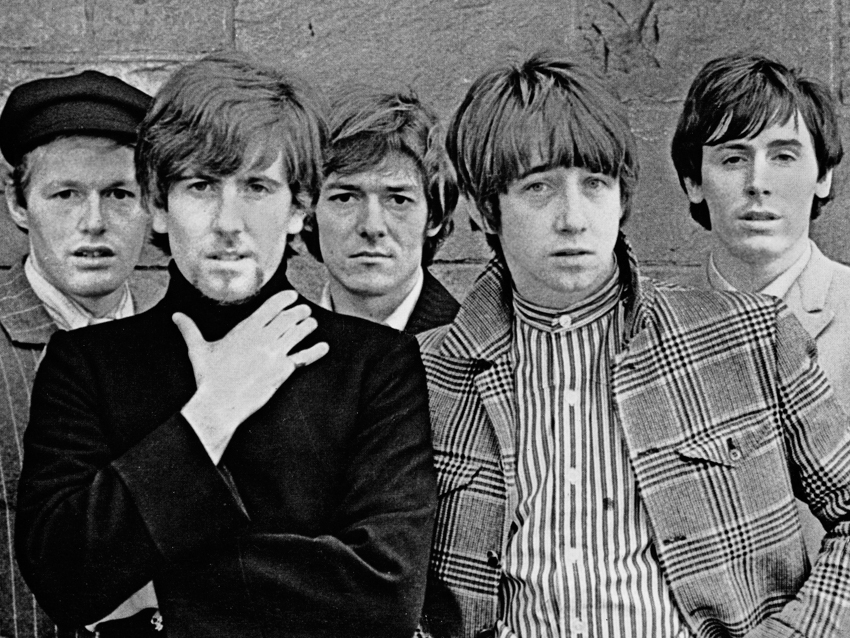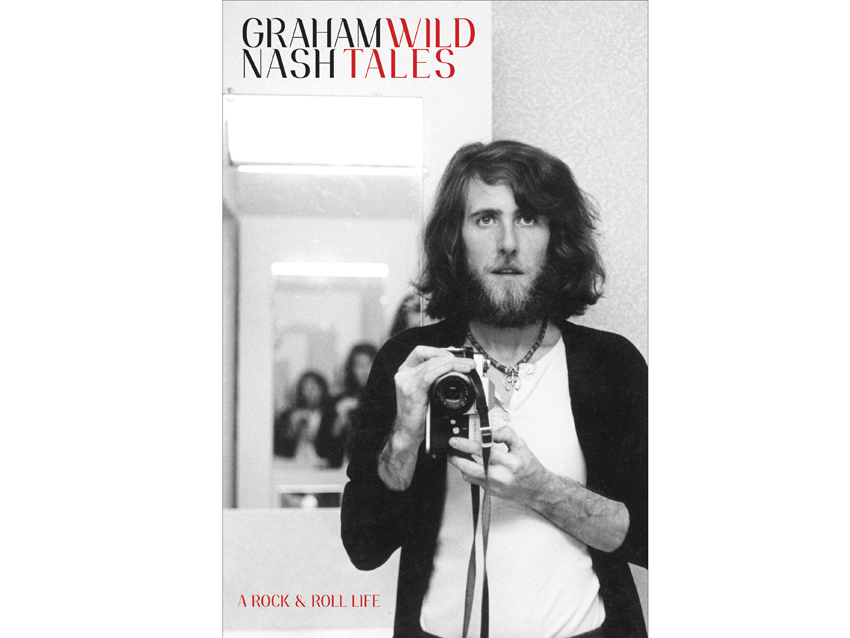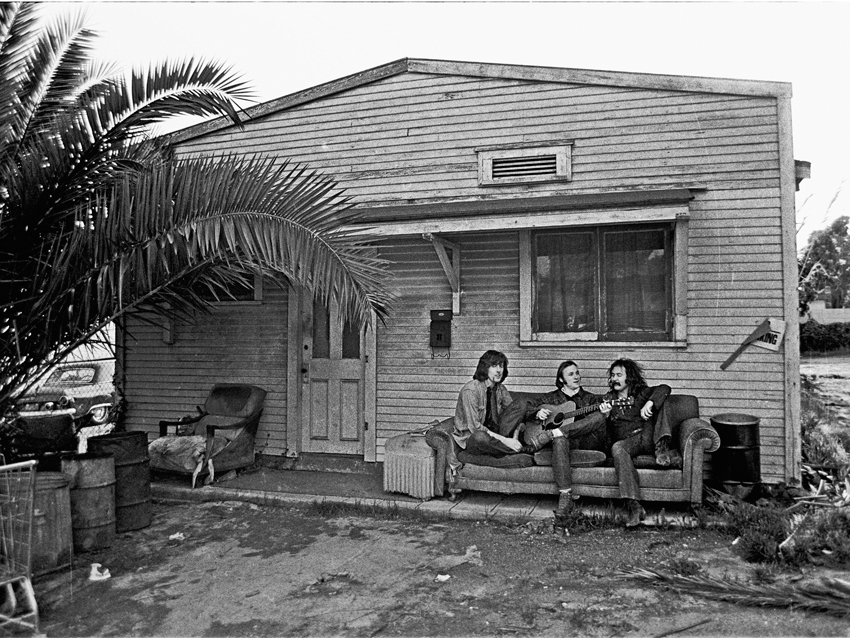
In his highly compelling and marvelously detailed memoir, Wild Tales: A Rock & Roll Life, published 17 September by Crown Archetype, two-time Rock And Roll Hall Of Fame inductee Graham Nash recounts his nearly six-decade-long love affair with music.
His astonishing career has seen the singer-songwriter and guitarist ride the crest of the British Invasion with The Hollies before settling in Los Angeles, where he made history with the formation of Crosby, Stills & Nash.
In Chapter 1, presented below, Nash paints a vivid picture of how CSN began to come about in 1968, during a tumultuous time in his life when both his marriage and his relationship with The Hollies were ending.
You can order Wild Tales: A Rock & Roll Life by Graham Nash at the Random House online store and on Amazon.
November, 1968
It always comes down to the music. I had a tune running through my head as my flight touched down a few minutes late at LAX. All my life I've had music in my head, but that night the tune (the theme from the TV series 77 Sunset Strip) was doing battle on my behalf, helping me fend off the other shit that was rattling around in there. For the past few months, my well-ordered world had been turned upside down, and throughout the long flight from London everything seemed to gang up on me. There was no escaping it in that crowded cabin. With few distractions, I'd taken stock of the difficult choices on my holy mess of a plate.
How's this for starters: I was contemplating leaving my country, my marriage, my bank account, and my band—all at once! Any one of those would have been enough to put a grown man in the hole, but I was close to running the table. My band, the Hollies, and I had come to an impasse. We had grown up together, spent many years making music, writing songs, drinking and larking about; we'd had a fantastic string of hits, incredible success— but from where I stood we were growing apart. I'd moved on, I was headed in an exciting new direction, and my heart and soul weren't in the Hollies anymore.
Get the MusicRadar Newsletter
Want all the hottest music and gear news, reviews, deals, features and more, direct to your inbox? Sign up here.
The same with my marriage. My wife, Rosie, and I had been drifting for some time. We both knew things were coming to an end. In fact, during the last six months, we'd been seeing other people. Now she was off in Spain chasing another man, and I was on my way to Los Angeles to visit a woman who had captured my heart.
I was also in love with LA and the States. I'd known it from the moment I first set foot on American soil. It was the Promised Land, and I was drenched in the Hollywood scene— the music, the sun, the palm trees, the attitude, the looseness. The way people there asked me, "What do you think?" In En gland, nobody ever asked your opinion of anything. You learned to keep your business to yourself, to mind your p's and q's. In America it seemed like there were no rules, everything was up for grabs, and I loved the freedom of it. I wanted all of it for myself.
No doubt about it, my life had gotten complicated. I was at a hell of a crossroads. There were plenty of unanswered questions. My plight became more apparent as I got off the plane and headed to the taxi stand. There was no point stopping for baggage. I had my guitar. That was it; that was all I had come with. Nothing else mattered. I was in America. I was going to see my new girlfriend, to be with Joni.
The sun had just left the western sky as the cab crawled up Laurel Canyon, bathing the Hollywood Hills in the golden flush of summer. I got a great vibe every time I came up here. Only a few minutes from the madness of the Strip, but a world apart. There was a shabby hippie chicness to it, with crazy little houses on stilts teetering along each side of the twisty-turny road. It was a place where there were free-spirited people just like me doing the things that I wanted to do, being creative and making music. I felt the pull of Laurel Canyon, its community spirit. Man, it looked like home to me.

The Hollies in New York City, 1967 © Henry Diltz
We stopped in front of a small wooden house on Lookout Mountain Avenue. It wasn't a posh affair, just a one-bedroom bungalow, a little jewel box, with a sloping shingled roof and a lovely garden out back on a lick of land. A tiny tree had taken root near the porch. A green VW van was parked by a mailbox at the curb. Inside, lights glowed brightly and I could hear the jingle- jangle of voices rising in unison. I knew she had company; I'd called her from the airport. And I knew who was with her. Still, I hesitated, fearing to intrude. I leaned on my guitar case and considered again where I was and what I was doing. Deep down, I was still a kid from the north of England, a place that continued to leave its mark on me. Sure, I know, I was an English rock star, I had it made. But my past made me feel that I wasn't cool, that maybe, even now, I was out of my element. Ahhh—what the hell? I'd been in all kinds of situations the past ten years. No point in getting hung up on that now.
Suddenly, Joni was at the door and nothing else mattered. It had been a few months since we'd last seen each other— and that was, in fact, the first time we'd met—but our connection was instant. Joni Mitchell was the whole package: a lovely, sylphlike woman with a natural blush, like windburn, and an elusive quality that seemed lit from within. Her beauty was almost as big a gift as her talent, and I'd been pulled into her orbit, captivated from the get-go.
Behind her, sitting at the dining room table, the two men I'd expected to see were finishing dinner. I grinned the moment I laid eyes on them.
"Hey, Willy!" David Crosby called from across the room, using a nickname reserved for my closest friends. He was one of those incredible guys it was impossible not to like, a gregarious character, irreverent as hell, with a gorgeous voice and a great sense of humor.
I'd met him almost two years earlier, when he was still a member of the Byrds, and we'd become fast friends. There was something that just clicked when we were together. We were on the same wavelength. We loved the same music and the same kind of women, including Joni, who'd been a lover of his some months back. Croz was a no-bullshit kind of guy who called things as he saw them. Besides, he always had the best dope in LA— maybe the best dope anywhere.
The guy next to him was Stephen Stills, an amazing guitar player who had just left Buffalo Springfield, one of the primo LA bands. We'd gotten to know each other a little the last time I'd been in the States. He was already something of an underground legend, a guy who played and held his own with Clapton and Hendrix, totally unique, with a slew of incredible songs. Together, Stills and Crosby were a powerful combination. They had great chops, and I could tell from things they said that they had something cooking.
Seeing them put me totally at ease. Plus Joni really loved them. Stephen had played on her first album, which David had produced. They were all great friends, really comfortable in each other's company, and were eager to roll me into their circle.
Crosby had been smokin' it before I got there and was reasonably high, so I had some catching up to do. They must have been making some music, too, because guitars were lying all over the place, which I'd come to learn was par for the course. In that Laurel Canyon scene, people always brought their guitars to dinner. They took their guitars everywhere; it was part of who they were. And at some point, someone would always say, "Get a load of this new song I'm working on." You could set your watch by it, never failed.

I hadn't been there a half hour when David whacked Stephen on the arm and said, "Hey, play Willy that song we were just doing." Stephen, who was sunk into an armchair next to a giant antique pig from a carousel, uncurled and grabbed his guitar. He fingerpicked a few bars of a beautiful intro while David walked over next to him and joined him in the verse. "In the morning, when you rise / do you think of me and how you left me crying . . ." Their harmonies were gorgeous, airtight, two- part— Stephen on the melody with David underneath— that rivaled the Everly Brothers. "Are you thinking of telephones / and managers and where you got to be at noon?" Iwas blown away. The song, "You Don't Have to Cry," was a killer, and their voices double- killed it. You hear something like that, you know it's special right away. The words and tune were perfectly pitched.
They got to the end and I said, "Fuck, that's a fabulous song! Man, Stephen, you wrote a beauty." I glanced at Joan, who was sitting by the piano, and flashed her a smile before asking them: "Would you mind doing it again?"
They looked at each other, shrugged, and said, "Okay."
The next time around I really concentrated on the lyric and the way their voices intertwined and shadowed each other. Hearing them individually, you'd think they'd sideswipe each other. David's tenor was polished to a high gloss, while Stephen's voice was husky and less disciplined, influenced by bluesy southern roots rock. Somehow they didn't compete so much as complement. And they had a natural vibrato, which cast a haunting shade. Those guys could sing.
But so could I.
"Okay, bear with me here," I said when they finished. "Do it one more time."
Three times, the same song. They must have thought I was stoned out of my gourd. But I was English and a guest, so they figured, let's amuse this guy. Now, I'm a quick study, so I already knew the words and had the harmony down. I'd been listening to it internally and thinking: I know what to do, I know where to go, I got it— I got it. As Stephen launched into the intro again, I casually made my way over, standing to his left, and when they hit the opening line— I'm there. I had my breath down, the phrasing, the tuning. I put my harmony above Stephen, and off we sailed. You are livvvv-ing a reality / I left years ago and it quite nearly killed me. In the lonnnng run . . . What a sound! We were locked in, tight as a drum. Flawless three- part harmony. It sounded so soft and beautiful, so incredible that a minute or so into the song we collapsed in laughter. Especially when we hit that chorus. It was insane!
"Wow! Wait a second. What the fuck was that?"

Graham Nash, Stephen Stills and David Crosby at the "infamous, disappearing house," Santa Monica, LA, 1969 © Henry Diltz
The three of us were harmony freaks and came from groups that had refined two- part as an art: the Hollies, the Springfield, and the Byrds. But the sound we'd just made was different, so fresh. We had never heard anything like it before. It was the Everly Brothers plus. And yet so simple: just one acoustic guitar and three people singing as one.
It shocked David and Stephen. I'm not sure they'd ever thought about the song in three parts. But I'd heard it right away.
Crosby was beaming ear to ear. "That's the best thing I ever heard!" he said.
I asked Joni: "Did that sound as incredible to you as it did to me?"
"Yeah, it sounded pretty incredible."
Something magical had happened, and we all knew it. When you sing with two or three people and you get it right— when the whole becomes greater than the sum of its parts— everything kind of lifts a couple feet off the ground. The three of us were levitating, all right. The vibe was so high, it was hard to touch down. There was an intense joy that we had found something new, an original sound different from anything that was out there. It was there, complete, a minute into our relationship. We all felt it, knew it. We wanted it for ourselves. But we were reluctant to discuss how to pull it off. It was almost as if we were afraid to talk about it, to let the secret out in case it wasn't there tomorrow morning.
Besides, there were so many roadblocks in our paths. To sing with these guys I would have to sever my ties with the Hollies— not such an easy thing to do. For one thing, they were my mates; I loved those guys. Allan Clarke and I had been joined at the hip since we were six years old, and I was an integral part of the group. I'd have to get out of my record contract, get my publishing rights back. It was a mess, but it could be done.
"We have to make this work," Stephen said.
I nodded. "We have no fucking choice but to make this work." There was no doubt in my mind. The moment I heard that sound I knew the rest of my life was headed in another direction. No two ways about it. I had no choice.
Eventually the guys left and, frankly, I was happy to see them go. I only had three days to spend with Joan, to get to know her intimately, and there are some things that even music doesn't trump. Nor did I see them the rest of the weekend. I was just with Joan; let's get real. But I couldn't get that sound out of my mind. I was haunted by those voices, the way they'd blended so naturally. And those guys. And their songs.
On the flight back to London, I was more fidgety than ever. Not confused: I knew now what was in my heart. I had fallen deeply in love with Joni Mitchell. I was a goner in that department. And those two rascals, Stills and Crosby, were messing with my head. Maybe I had fallen for them, as well.
Everything in my world was spinning, colliding, but I knew what I had to do. There was no doubt in my entire body. And by the time the plane touched down I had it all figured out. I was going home to untangle the first twenty- six years of my life, and to tie up loose ends for the next however many decades. I had heard the future in the power of those voices. And I knew my life would never be the same.
Reprinted from the book WILD TALES by Graham Nash. Copyright © 2013 by Graham Nash. Published by Crown Archetype, an imprint of Crown Publishing Group, a division of Random House LLC, a Penguin Random House Company.
Joe is a freelance journalist who has, over the past few decades, interviewed hundreds of guitarists for Guitar World, Guitar Player, MusicRadar and Classic Rock. He is also a former editor of Guitar World, contributing writer for Guitar Aficionado and VP of A&R for Island Records. He’s an enthusiastic guitarist, but he’s nowhere near the likes of the people he interviews. Surprisingly, his skills are more suited to the drums. If you need a drummer for your Beatles tribute band, look him up.
“I parted company with my trusty Fender Strat, previously owned by Lemmy, and part exchanged it for a flute. It just looked nice and shiny!”: How Jethro Tull's Ian Anderson became rock’s leading one-legged flautist
“Sometimes I am two people. Johnny is the nice one. Cash causes all the trouble. They fight”: How Johnny Cash drew on his own experiences to make his greatest songs










